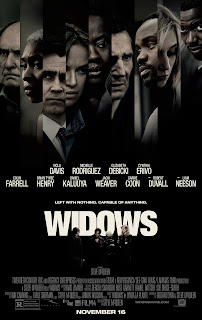(Dir: Luca Guadagnino, 2018)
Should there be such a thing as untouchable films; sacred cows that exist in perpetuity never to be remade or reimagined? There is a of course a double standard – Gus Van Sant got skewered in 1998 for remaking Psycho whilst Bradley Cooper is currently receiving plaudits for a fourth version of A Star Is Born. The music industry has always relied on the cover version (or standards as they used to be called). Why shouldn't classic films be reimagined if they can bring something new to the table? Perhaps they can actually improve on the original (a heretical thought!)? Of course if you don't like the idea of a new version you don't have to watch it and the original will always exist!
In the horror canon Dario Argento's Suspiria is hailed as something of a masterpiece, hence the inevitable consternation about this new version. However director Luca Guadagnino has wisely called his 2018 update a "cover version" and actively tries to bring something new to the table. This is still the story of a young American dancer joining a German dance company only to discover there's something very sinister lurking beneath the surface. But it's an expanded version of Argento's original. The setting is Berlin in the late seventies, amidst the waves of social unrest and terror campaigns, which plays a fairly significant role in the setting and tone of the story. It's always grey, always raining or snowing, and a bleak place to exist. But it's somewhere that Susie (Dakota Johnson) is drawn too, especially to company artistic director Madame Blanc (Tilda Swinton), seemingly ever since her youth.
Susie is put through her paces by Mme Blanc and Johnson does a fantastic job with the complex choreography, as do the whole company, making the dance scenes a pleasure to watch. There's always a portentous quality to them as they veer into avant-garde territory, whilst the music is dramatic and the malevolent eyes of the matrons delight in the potential of what they see. It feels like there's a real purpose behind the dancing beyond it existing as a façade. There are perhaps fewer strange goings-on than in the original, but Guadagnino deviates path as the film progresses to it's final acts, leading to something much weirder yet strangely more satisfying.
The film is shot on 35mm and utilises stylistic qualities from years gone by, making it seem to fit into it's timeframe, the era the original came from. One of Argento's most notable elements was his use of colour, primarily red. This new version doesn't forget that but it takes it's time to make an appearance as much of the setting is muted and drab.
Suspiria takes it's time. It's almost an hour longer than the original and it is a long slow build. There could've perhaps been a little tightening up along the way but the cast grip your attention, especially Johnson, Swinton and Mia Goth, who plays the inquisitive Sara and takes on some of the plot driving elements from the Suzy of the original. And not forgetting Dr Josef Klemperer (Lutz Ebersdorf – or is it?) who is an intriguing character given a lot of attention, but who mostly seems fits with the wider context of the story's setting.
Ultimately this new take on Suspiria is a worthy adaptation of the original, starting at the same place but ending up in some other hallucinatory mindfuck. The denouement is superb and although it takes it's time getting there, it's worth taking the journey. Plus we get to enjoy some excellent dance scenes and a very good soundtrack along the way. Both films excel in different ways and this new version is very good, justifying it's existence.






